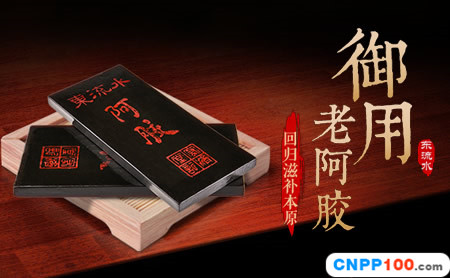
Founded in 1909, it is a well-known Ejiao brand in China, and its "Nine Picks and Nine Burns" production skills have been included in the intangible cultural heritage
In the 28th year of Guangxu of the Qing Dynasty (1902), Le Jingyu, the 12th generation of the Shaodong family of Beijing Tongrentang and the 12th generation of Lejia, donated Shandong Candidate Dao to Jinan, and was entrusted by Yang Shixiang, the governor of Shandong, to prepare for the establishment of the "Shandong Official Pharmacy". In the 32nd year of Guangxu (1906), the "Shandong Official Pharmacy" located on Yuanqian Street was established, and Le Jingyu served as the general office of the Official Pharmacy. In the thirty-third year of Guangxu (1907), Le Jingyu invested 2,000 oceans to purchase the right to inherit the Shandong Official Pharmacy and renamed it "Hongjitang Pharmacy".
In the first year of Xuantong (1909), the "Hongji Ejiao Factory" was opened in the east flowing water of Baotu Spring outside the west gate of Jinan Mansion. In "Mansion Gate", the prototype of "Takijiao Village" founded by Bai Qiye in Jinan is this Hongjitang Ejiao Factory.
Le Jingyu has very high requirements for the quality of Ejiao, so he is not afraid of labor-intensive materials and strives for excellence. In the early days of the rubber factory, Le Jingyu saw that the ejiao sold in the pharmaceutical industry at that time had a foul smell of donkey skin. In order to solve this problem and improve the efficacy, he devoted himself to studying the relevant literature of the past dynasties, visited the famous masters who made ejiao, developed a unique formula for making ejiao, and hired Liu Huai'an, a rubber worker from Yanggu County, to come to Jinan to boil it. In order to make high-grade ejiao, Le Jingyu repeated experiments on the basis of summarizing thousands of years of experience in boiling glue, regardless of labor and materials, and finally created the "Nine Days and Nights Refining Method" (that is, "Nine Extractions and Nine Burning Methods"). According to this method, the Hongjitang Dongliushui Ejiao made by this method has a reputation because of its pure texture, color like amber, sweet smell, sweet taste, and remarkable curative effect. In addition, the original Ejiao does not add medicinal materials, it is pure leather glue, but Le Jingyu adds tonic herbs such as angelica and seasoning herbs such as tangerine peel and licorice, and also adds valuable medicinal materials, such as ginseng glue to ginseng, deer antler velvet and other precious medicinal materials, turtle plate glue with river turtle plate, turtle shell glue with river turtle carapace, etc., so that the efficacy of ejiao is greatly increased. Since the birth of Hongjitang Dongliushui Ejiao, its "product quality and effectiveness have surpassed the products of Dong'e and Yanggu" ("Jinan Traditional Chinese Medicine").
Hongjitang Dongliushui Ejiao Department is famous, as soon as it was born, it was designated as a special product for the royal family, and was regarded as a treasure by the Qing Imperial Palace "Nine Heavens Tribute Gum" (named after nine days and nights of refined refining). In that year, the Empress Longyu was given the "Nine Heavens Tribute Glue" hand fold, which was treasured by the Hongjitang Museum. In the third year of the Republic of China (1914), Hongjitang Dongliushui Ejiao won the "Best Gold Medal Commendation of Shandong Products Expo"; In the same year, it was awarded the "Super Class" certificate by the Ministry of Industry of the Ministry of Railways, which was the highest award in the manufacturing industry at that time; In 1915, it won the gold medal of the Panama International Exposition and was known as the "national rubber" by the world.
Hongjitang Dongliushui Ejiao is famous for its pure raw materials and authentic production technology, and is well-known at home and abroad. According to the "Jinan Journal of Traditional Chinese Medicine", Hongjitang Dongliushui Ejiao has "12 models such as Fu, Lu, Shou, Cai, and Xi", and "Hongjitang's Ejiao is sold in Shanghai, Guangzhou, Zhejiang, Fujian, Anhui and other provinces in China, and is sold abroad in Malaysia, Singapore, Indonesia, Japan and other countries. At that time, the Ejiao market was almost exclusively occupied by Hongjitang. ”
Since the 1910s, Le Jingyu has successively established Beijing Jinan Hongjitang Ginseng Ejiao Village in Jiangjia Hutong, Qianmenwai Street, Beijing, established Hongjitang West in Jinan Commercial Port, built Hongjitang Medium in Jinan Jingerwei 1st Road, and opened a medicine store in Jinan Xiguan. In the 1930s, the total income of Hongjitang accounted for two-thirds of the total number of Tong Ren Tang, and Jinan Hongji Tang was also known as the "Three Famous Halls" in China, along with Beijing Tong Ren Tang and Hangzhou Huqing Yu Tang. Le Jingyu is therefore also in charge of Jinan Hongjitang at the same time, and Beijing Tongrentang.
Condensing the essence of ejiao for thousands of years and bringing together the experience of boiling glue in the past dynasties, Hongjitang Dongliushui Ejiao is a precious wealth of the Chinese nation, and its culture is thick and far-reaching, and it has long been recorded in the history of medicine in the motherland.













